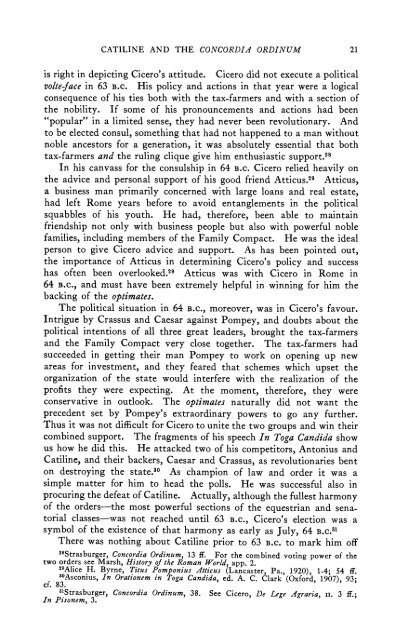Catiline and the "Concordia Ordinum" - Historia Antigua
Catiline and the "Concordia Ordinum" - Historia Antigua
Catiline and the "Concordia Ordinum" - Historia Antigua
Create successful ePaper yourself
Turn your PDF publications into a flip-book with our unique Google optimized e-Paper software.
CATILINE AND THE CONCORDIA ORDINUM 21<br />
is right in depicting Cicero's attitude. Cicero did not execute a political<br />
volte-face in 63 B.c. His policy <strong>and</strong> actions in that year were a logical<br />
consequence of his ties both with <strong>the</strong> tax-farmers <strong>and</strong> with a section of<br />
<strong>the</strong> nobility. If some of his pronouncements <strong>and</strong> actions had been<br />
"popular" in a limited sense, <strong>the</strong>y had never been revolutionary. And<br />
to be elected consul, something that had not happened to a man without<br />
noble ancestors for a generation, it was absolutely essential that both<br />
tax-farmers <strong>and</strong> <strong>the</strong> ruling clique give him enthusiastic support.28<br />
In his canvass for <strong>the</strong> consulship in 64 B.C. Cicero relied heavily on<br />
<strong>the</strong> advice <strong>and</strong> personal support of his good friend Atticus.29 Atticus,<br />
a business man primarily concerned with large loans <strong>and</strong> real estate,<br />
had left Rome years before to avoid entanglements in <strong>the</strong> political<br />
squabbles of his youth. He had, <strong>the</strong>refore, been able to maintain<br />
friendship not only with business people but also with powerful noble<br />
families, including members of <strong>the</strong> Family Compact. He was <strong>the</strong> ideal<br />
person to give Cicero advice <strong>and</strong> support. As has been pointed out,<br />
<strong>the</strong> importance of Atticus in determining Cicero's policy <strong>and</strong> success<br />
has often been overlooked.29 Atticus was with Cicero in Rome in<br />
64 B.c., <strong>and</strong> must have been extremely helpful in winning for him <strong>the</strong><br />
backing of <strong>the</strong> optimates.<br />
The political situation in 64 B.c., moreover, was in Cicero's favour.<br />
Intrigue by Crassus <strong>and</strong> Caesar against Pompey, <strong>and</strong> doubts about <strong>the</strong><br />
political intentions of all three great leaders, brought <strong>the</strong> tax-farmers<br />
<strong>and</strong> <strong>the</strong> Family Compact very close toge<strong>the</strong>r. The tax-farmers had<br />
succeeded in getting <strong>the</strong>ir man Pompey to work on opening up new<br />
areas for investment, <strong>and</strong> <strong>the</strong>y feared that schemes which upset <strong>the</strong><br />
organization of <strong>the</strong> state would interfere with <strong>the</strong> realization of <strong>the</strong><br />
profits <strong>the</strong>y were expecting. At <strong>the</strong> moment, <strong>the</strong>refore, <strong>the</strong>y were<br />
conservative in outlook. The optimates naturally did not want <strong>the</strong><br />
precedent set by Pompey's extraordinary powers to go any fur<strong>the</strong>r.<br />
Thus it was not difficult for Cicero to unite <strong>the</strong> two groups <strong>and</strong> win <strong>the</strong>ir<br />
combined support. The fragments of his speech In Toga C<strong>and</strong>ida show<br />
us how he did this. He attacked two of his competitors, Antonius <strong>and</strong><br />
<strong>Catiline</strong>, <strong>and</strong> <strong>the</strong>ir backers, Caesar <strong>and</strong> Crassus, as revolutionaries bent<br />
on destroying <strong>the</strong> state.30 As champion of law <strong>and</strong> order it was a<br />
simple matter for him to head <strong>the</strong> polls. He was successful also in<br />
procuring <strong>the</strong> defeat of <strong>Catiline</strong>. Actually, although <strong>the</strong> fullest harmony<br />
of <strong>the</strong> orders-<strong>the</strong> most powerful sections of <strong>the</strong> equestrian <strong>and</strong> senatorial<br />
classes-was not reached until 63 B.C., Cicero's election was a<br />
symbol of <strong>the</strong> existence of that harmony as early as July, 64 B.c.3"<br />
There was nothing about <strong>Catiline</strong> prior to 63 B.C. to mark him off<br />
28Strasburger, <strong>Concordia</strong> Ordinum, 13 ff. For <strong>the</strong> combined voting power of <strong>the</strong><br />
two orders see Marsh, History of <strong>the</strong> Roman World, app. 2.<br />
29Alice H. Byrne, Titus Pomponius Atticus (Lancaster, Pa., 1920), 1-4; 54 ff.<br />
3oAsconius, In Orationem in Toga C<strong>and</strong>ida, ed. A. C. Clark (Oxford, 1907), 93;<br />
cf. 83.<br />
31Strasburger, <strong>Concordia</strong> Ordinum, 38. See Cicero, De Lege Agraria, 11. 3 ff.;<br />
In Pisonem, 3.

















